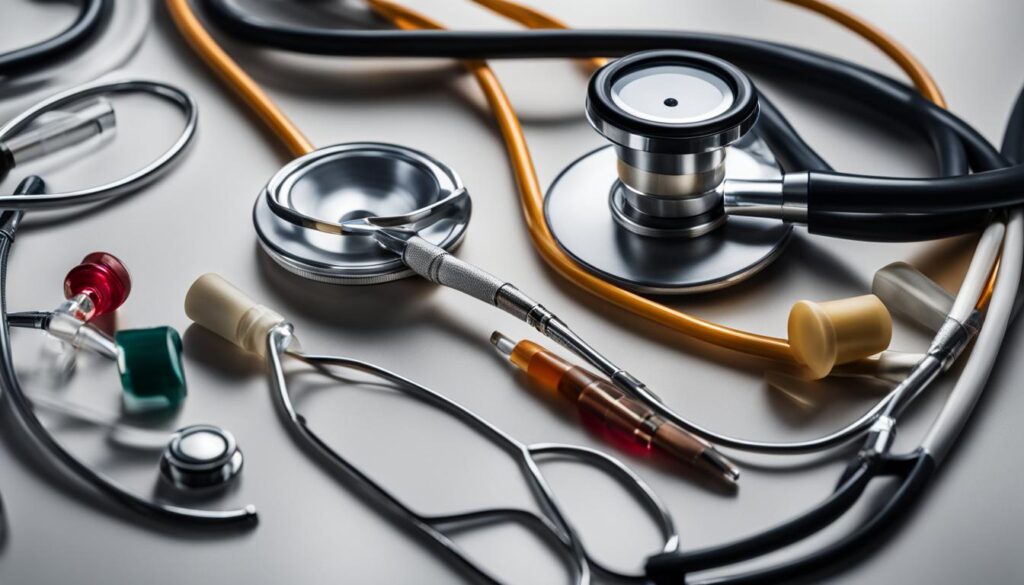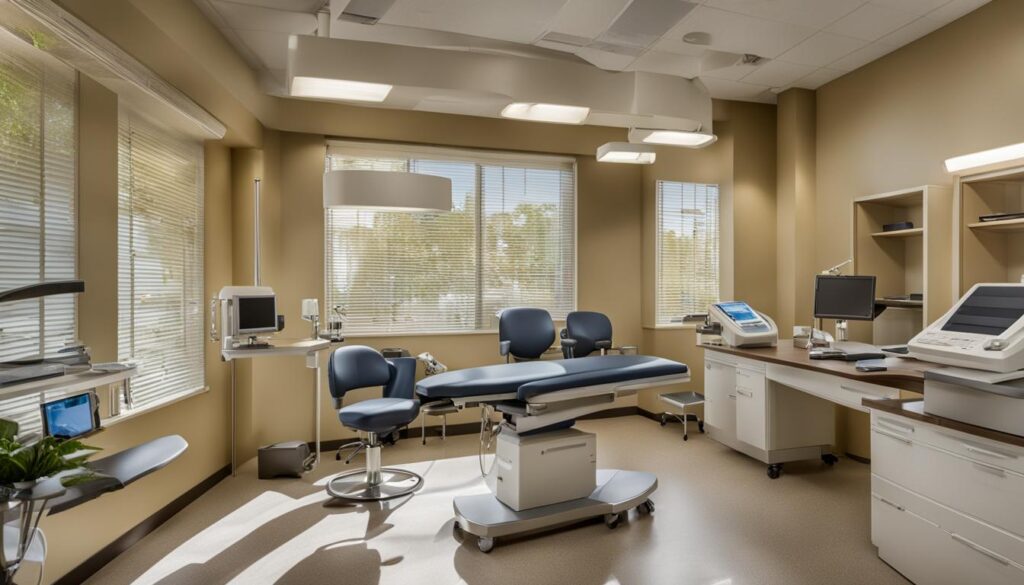As a doctor, you are committed to providing the best possible care for your patients. Enhancing your skills and efficiency can help you achieve this goal and ultimately empower healthcare as a whole. In this section, we will explore ten tips that can help you improve your practice and provide better care to your patients.
Key Takeaways:
- Implementing these ten tips can help you enhance your skills and efficiency in your practice.
- Improving your knowledge and staying updated on the latest advancements in medicine is crucial.
- Effective communication skills are essential to building strong relationships with your patients.
- Streamlining processes, optimizing time management, and utilizing technology can enhance efficiency in your practice.
- Building collaborative relationships with fellow doctors and healthcare professionals can be beneficial for both the patients and the doctor.
Improve Your Knowledge and Stay Updated
As a doctor, it’s crucial to always be expanding your knowledge and staying up-to-date on the latest developments in the medical field. With new diseases emerging and medical research constantly evolving, it’s essential to keep yourself informed. Here are ten tips for doctors on how to improve your knowledge and stay updated:
- Read medical journals regularly: Medical journals are an excellent source of new information as they contain the latest research and findings. Reading them regularly can keep you up-to-date with developments in your field.
- Attend conferences and seminars: Attending conferences and seminars can be a great way to learn from experts in your field and stay current on the latest developments.
- Join a professional medical association: Professional medical associations can provide you with access to new research and developments in your field, as well as networking opportunities with other doctors.
- Take online courses: Online courses are an excellent way to learn and stay up-to-date on the latest developments in medicine, especially if you have a busy schedule.
- Participate in research studies: Participating in research studies can provide you with firsthand experience on the latest developments in your field.
- Network with other doctors: Networking with other doctors can help you stay informed about new developments in your field and even lead to potential collaborations.
- Follow medical news and blogs: Following medical news and blogs can give you quick access to the latest information and developments in your field.
- Stay informed about new treatments and medications: Keeping up-to-date on new treatments and medications can help you provide the best care to your patients.
- Consult with colleagues: Consult with your colleagues about new developments and treatments in medicine that they may have come across.
- Stay curious: Continuously asking questions and seeking out new information can help you stay engaged and up-to-date with the latest developments in your field.
By following these ten tips for doctors, you can stay informed on the study of new diseases and the latest medical advancements. This can help you provide the best care for your patients and continuously improve your skills as a doctor.

Develop Effective Communication Skills
Developing effective communication skills is crucial for providing exceptional healthcare. By being attentive and actively listening to your patients’ concerns, you can build trust and improve your patient-doctor relationships. Here are some tips for improving your communication skills:
- Listen: Pay attention to your patient’s concerns and ask open-ended questions to encourage them to elaborate.
- Be Empathetic: Show empathy and understanding towards your patient’s emotions, even if you don’t necessarily agree with their perspective.
- Speak Clearly: Use simple language and avoid medical jargon that your patient may not understand.
- Provide Clarity: Ensure that the patient understands their condition, treatment options and any potential risks and benefits
Effective communication does not just involve verbal communication; it is also important to pay attention to nonverbal cues such as body language and facial expressions. By being attentive and using effective communication skills, you can build positive and trust-based relationships with your patients.

“Effective communication is the foundation of healthcare. By building trust-based relationships with your patients, you can provide exceptional healthcare and improve their overall well-being.”
Enhance Efficiency in Your Practice
Efficiency is crucial in providing quality healthcare. It enables you to attend to more patients while maintaining a high standard of care. Here are ten tips to enhance efficiency in your practice:
- Set Priorities: Establish which tasks need to be done first and delegate tasks to your staff accordingly.
- Optimize Scheduling: Use scheduling tools to ensure appointments are synchronized, enabling you to attend to patients efficiently.
- Utilize Technology: Embrace technology and use it to your advantage. Implement systems such as electronic health records (EHR) and telemedicine to streamline your practice.
- Delegate Tasks: Delegate tasks such as administrative work and follow-up appointments to support staff, allowing you more time to attend to your patients.
- Standardize Processes: Develop a process that standardizes daily operations. This saves time, ensures consistency, and reduces errors.
- Manage Patient Expectations: Be clear about wait times, treatment times, and appointment lengths. This helps patients understand what to expect and can reduce time spent on unnecessary questions.
- Implement Shortcuts: Use shortcuts such as templates for common tasks, pre-made prescriptions, and forms to save time.
- Streamline Communication: Use HIPAA-compliant messaging platforms to communicate with your staff and patients, reducing lag time and increasing efficiency.
- Use Effective Billing Practices: Implement an efficient billing system, review it regularly, and use coding software to simplify the billing process.
- Track Progress: Monitor your progress and adjust your operations where necessary. Regularly reviewing your practice’s operations helps you identify where improvements can be made.
Implementing these tips can make a significant difference in enhancing efficiency in your practice. Remember, time is always of the essence. Utilize it optimally, and you’ll be able to provide better care for your patients.

Foster Collaborative Relationships with Colleagues
Collaborating with fellow healthcare professionals can be a valuable way to enhance your skills as a doctor. Building a strong interdisciplinary team can improve patient outcomes and provide more comprehensive care. Here are some tips to help you foster collaborative relationships with your colleagues:
- Communicate regularly: Schedule regular meetings with your colleagues to discuss patient cases and share ideas. Use technology to your advantage and stay connected through virtual platforms if in-person meetings are not feasible.
- Establish a mutual respect: Show respect for your colleagues’ expertise and perspectives while sharing your own. Remember, even with differing opinions, you’re all working towards the same goal – improving patient care.
- Keep an open mind: Be open to feedback and suggestions from your colleagues. Everyone has different strengths and weaknesses, and by working together, you can learn from each other and improve outcomes for your patients.
- Collaborate on research: Engage in collaborative research with your colleagues to explore new areas and advance your field of expertise.
Collaborative relationships with your colleagues can only lead to positive results, allowing you to tap into the collective knowledge and skills of the healthcare team. So, start building a network of colleagues today to strengthen your doctors’ skills and enhance your practice.

Conclusion
By implementing these ten tips for doctors, you can empower yourself to provide better healthcare. Improving your knowledge and staying updated on new diseases and medical research, developing effective communication skills, enhancing efficiency in your practice, and fostering collaborative relationships with colleagues can all contribute to the betterment of healthcare as a whole.
Remember, by making small changes in your practice, you can have a significant impact on your patients’ lives. Take the time to implement these strategies and witness the positive impact they bring. Thank you for making a difference and empowering healthcare.
FAQ
What are the ten tips for doctors to empower healthcare?
The ten tips for doctors to empower healthcare include improving knowledge and staying updated, developing effective communication skills, enhancing efficiency in practice, fostering collaborative relationships with colleagues, and more. Keep reading to explore these valuable tips further.
Why is staying updated on the study of new diseases important for doctors?
Staying updated on the study of new diseases is crucial for doctors to provide the best care to their patients. It allows them to stay informed about the latest advancements in medicine and incorporate new treatment methods or protocols into their practice.
How can doctors develop effective communication skills with their patients?
Developing effective communication skills involves being attentive and actively listening to patients’ concerns. By doing so, doctors can build trust, establish a strong rapport, and improve patient-doctor relationships, ultimately leading to better healthcare outcomes.
What can doctors do to enhance efficiency in their practice?
Doctors can enhance efficiency in their practice by streamlining processes, optimizing time management, and effectively utilizing technology. These strategies can help save time, improve workflow, and ultimately provide more efficient and effective healthcare services.
Why is fostering collaborative relationships with colleagues important for doctors?
Fostering collaborative relationships with colleagues, including fellow doctors and healthcare professionals, is important because it promotes teamwork and interdisciplinary collaboration. Such collaborations can lead to better patient care, shared knowledge, and improved healthcare outcomes overall.
How can implementing these ten tips empower healthcare?
By implementing these ten tips for doctors, healthcare can be empowered by enhancing doctors’ skills, improving patient interactions, increasing efficiency in practice, fostering collaboration, and ultimately providing better healthcare services to patients.
